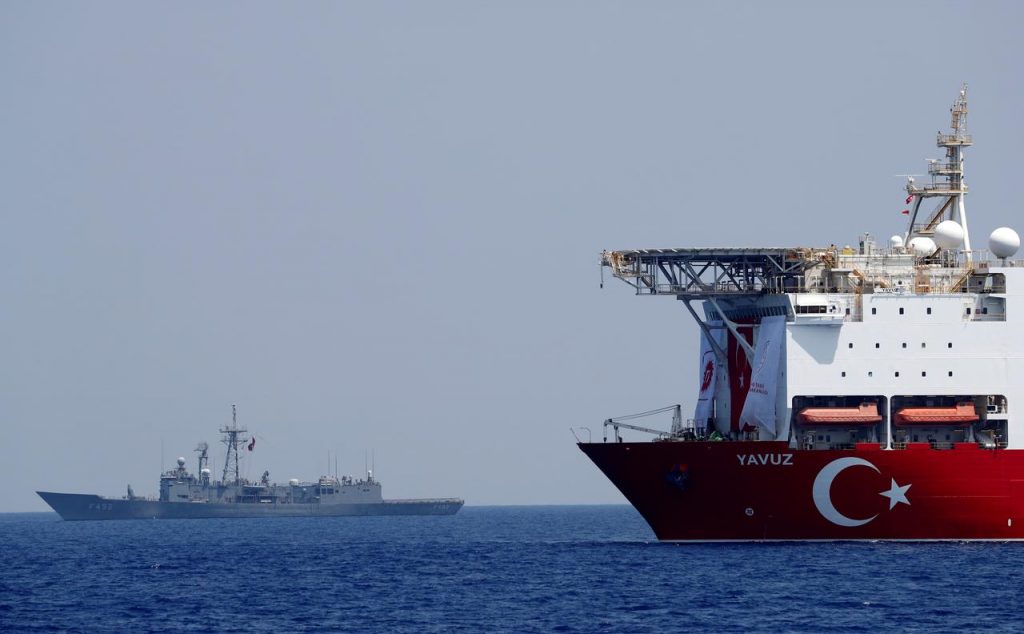
- ARAB NEWS
- 09 Jul 2025

While watching recent developments in the eastern Mediterranean, including the deal between Turkey and Libya, I recalled a notorious article written by Pinar Bilgin, professor of international relations at Bilkent University in Ankara, titled “Whose Middle East?”
She identified four Middle East regions: The Middle East, Arab Middle East, Muslim Middle East and Mediterranean Middle East. I want to focus on the fourth of these, which is a region in which the EU’s security perceptions play a significant role.
Since the discovery of offshore gas in the eastern Mediterranean a decade ago, littoral states have, in an attempt to maximize their national interests, sought to leverage these natural resources, signing bilateral treaties and interpreting international laws accordingly. The international community is deadlocked in its attempts to find a path toward de-escalation of tensions and conflict in the Eastern Mediterranean, which is a multilayered problem with several aspects, one of which is Libya.
Libya is effectively a divided country in which several international players have stakes in the ongoing civil war. The destructive conflict that followed the fall of former leader Muammar Qaddafi in October 2011 shows no sign of reaching a peaceful resolution any time soon. Moreover, it has grown to include a number of elements, such as proxy wars, and further divided the country along political and ideological lines.
On the one side there is the government in Tripoli, which is backed by Ankara, while on the other there is Gen. Khalifa Haftar’s Libyan National Army, the backers of which include the US, Russia and the Gulf countries.
The Turkish-Libyan deal was signed against the backdrop of this complicated situation in Libya and rising tensions in the eastern Mediterranean. On Nov. 27, Turkish President Recep Tayyip Erdogan and the Libyan government of Fayez Al-Sarraj signed a memorandum of understanding that established the maritime boundaries between the two states in the Mediterranean Sea. Regarded as a legal agreement, it was ratified by the Turkish Parliament on Dec. 5 and and came into effect when it was published in the official gazette two days later.
The ratification was an indication that the agreement was not only a policy of the ruling government but represents the general view of all the country’s political parties. The deal is considered historic as it is Turkey’s first exclusive economic zone (EEZ) agreement with a littoral country. An EEZ is a sea zone over which a state has special rights regarding the exploration and use of marine resources. The agreement was welcomed by all parties in Turkey, who agreed it was in the country’s national interest since it secured drilling, pipeline and other maritime rights over an expanded portion of the Mediterranean Sea between the two nations.
There were two interpretations of the deal in Turkey. Those critical of the government’s foreign policy argue that it is controversial, not least because the future of the deal depends on the future of Libya.
Given that Turkey has taken sides, the success or failure of the deal is dependent on the success or failure of its Libyan allies. Those who support the government’s foreign policy argue that in one fell swoop, the deal destroyed the plans of hostile littoral countries in the eastern Mediterranean.
There was a harsh reaction to the deal from other littoral states, in particular Greece. In addition to the maritime boundary delimitation agreement, Turkey and Libya also signed an expanded security and military cooperation agreement. Turkish Defense Minister Hulusi Akar on Dec. 8 said the deal is neither a threat nor a breach of the legal rights of other countries.
Erdogan said that the military accord grants Turkey the right to deploy troops in Libya if requested by the government in Tripoli. This would not violate a UN arms embargo on Libya, he added, a country that is plagued by factional conflicts.
In June, Haftar said he had cut all ties with Turkey and that any Turkish commercial flights or ships that attempted to enter Libya would be treated as hostile.
A mature dialogue, promoted by the incoming EU leadership, about maritime borders between the littoral states — especially between NATO allies Turkey and Greece — seems to be crucial to avoid the region descending into chaos.
Sinem Cengiz
Given all of these developments, all eyes were on the response from Russia, which is a significant partner of Turkey in Syria. On Tuesday, Erdogan will talk with Russian counterpart Vladimir Putin about the latest developments in Libya and the situation with Haftar. He said Libya risks turning into “another Syria.” In a recent television interview, the president pledged to appeal personally to Putin during a meeting in January. Turkey’s special representative to Libya stated that Putin is due to visit Turkey on Jan. 8 and Libya will be discussed. In addition to Syria, therefore, Moscow and Ankara are increasingly finding themselves at odds on Libya.
Whether or not Turkey would send troops to Libya is open to question. It is clear that although all Turkish politicians welcomed the agreement with Libya, many would likely oppose any troop deployment in a country that, unlike Syria, is not exactly on Turkey’s doorstep. Also, taking into account the stance of Russia and the US on Libya, it is likely that sending troops there would provoke a reaction from the international community.
Given all this, serious responsibility falls on the shoulders of the international community, in particular the EU, to de-escalate rising tensions. A mature dialogue, promoted by the incoming EU leadership, about maritime borders between the littoral states — especially between NATO allies Turkey and Greece — seems to be crucial to prevent the region from descending into chaos.